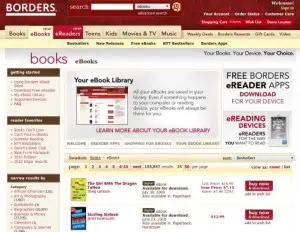
Borders has closed. This is a shame and a travesty. In an era when there is more being published and more of the population is literate than ever before, why is a bookstore closing? One issue that has risen out of this is something that I alluded to in an earlier article on eBooks. Namely: what happens to your content when the content provider closes up shop? Thankfully, in this case, Borders had been transitioning its eBook clients from their servers to Kobos, so they weren’t left high and dry with no access to their purchases. Will all eBook providers be this kind when they, as with the vast majority of businesses, either close up shop or give up on one technology and move to a new one?
Several events in recent years, some directly related to eBooks, others only tangentially related via technology, have made me wary of relying on a third party to give me ongoing access to material I have paid for. One is, and I think I’ve mentioned this before, the time that Amazon reached into the Kindle accounts of any North American user who had purchased a copy of (ironically) 1984 by George Orwell and plucked it out of their account. They did this because it turned out they did not have permission to be selling this particular edition as an eBook. This draconian measure only serves to highlight the impermanent and transitional state of the eBook, of digital files in generally, really.
Cloud computing as a concept is a recent innovation. Never before has storage capacity been so cheap and bandwidth so plentiful that it was easier to store files on a server on the other side of the country, or world even, than on your own computer. It provides ease of access solutions that were not thought possible even 20 years ago. This is true for eBooks as it is for someone syncing their phone calendar with gmail’s calendar. In the case of eBooks, cloud storage and syncing allow for you to start reading a book on one device, and then pick up in the exact same spot on another device. This is a wonderful idea. If I’m reading a book on my phone and the battery dies, I can turn on my laptop or my tablet and keep reading right where I left off. In order for this functionality to work, though, you have to be storing the book (or at least a copy of it) on a server somewhere. If this server goes down you lose this functionality, and, depending on the device you are using, you also will lose access to the book itself. If this is a temporary outage it’s a bit annoying, (like what happened when Google dropped all the emails from a few people’s accounts a few months ago) but if the company running the server goes out of business and no provisions were made for continuity of service? I hope that you’d already finished your book.
Some people might say this couldn’t happen, that you’ve paid for the book and the company that sold it going out of business can’t mean you lose what you paid for.
In this era of born-digital files that is exactly what can happen, and in some cases, already has happened. Several years ago Wal-Mart was selling music files that were locked with DRM. DRM is short for Digital Rights Management, a way for a company to lock down access to a digital file by dictating how it can be used. Every time you opened one of these DRM-ridden files that you had bought your computer was communicating with a server that authenticated that yes, this was the file and yes, this computer had authorization to play this file. If the server went down, though, there was no way to play the file. You were locked out of content you had paid for. When Wal-Mart got out of the digital music business the servers were shut down. Good-bye files. This has happened since with other video file providers, video game providers, etc.
I’m not saying don’t buy eBooks. I read eBooks and digital comics on my ipad. I just want people to go into this with their eyes open and to know the risks associated with storing your content on someone else’s servers. And, you know, if you buy a print book, not only do you know that it’s physically yours, but you’re also helping keep a brick-and-mortar bookstore in business.

Interesting post, but I was immediately put off by a book person whose very title is grammatically incorrect! It’s “you and me.” Please, please correct!
Pobody’s nerfect.
thanks: it’s amazing how much more credence your post(s) have when it’s obvious that you care enough about reading & the language to get the words right…sorry, I’m just a bit anal like that. Thanks for taking it the right way!
When I purchase pricey e-books, it irks me somewhat that I cannot resell them when done. Some titles are only available digitally these days.
Also, it is a bit creepy when e-book services like Kindle and Kobe know where you are at in a book at all times and that a Kindle reader keeps track of how many people have highlighted certain passages in a book.
When I was looking at and researching ereaders, I must admit that Borders’ looming bankruptcy gave me pause. I am happy to learn that they figured out some way to keep their ereaders working.
For what it’s worth, I eventually settled on a nook.